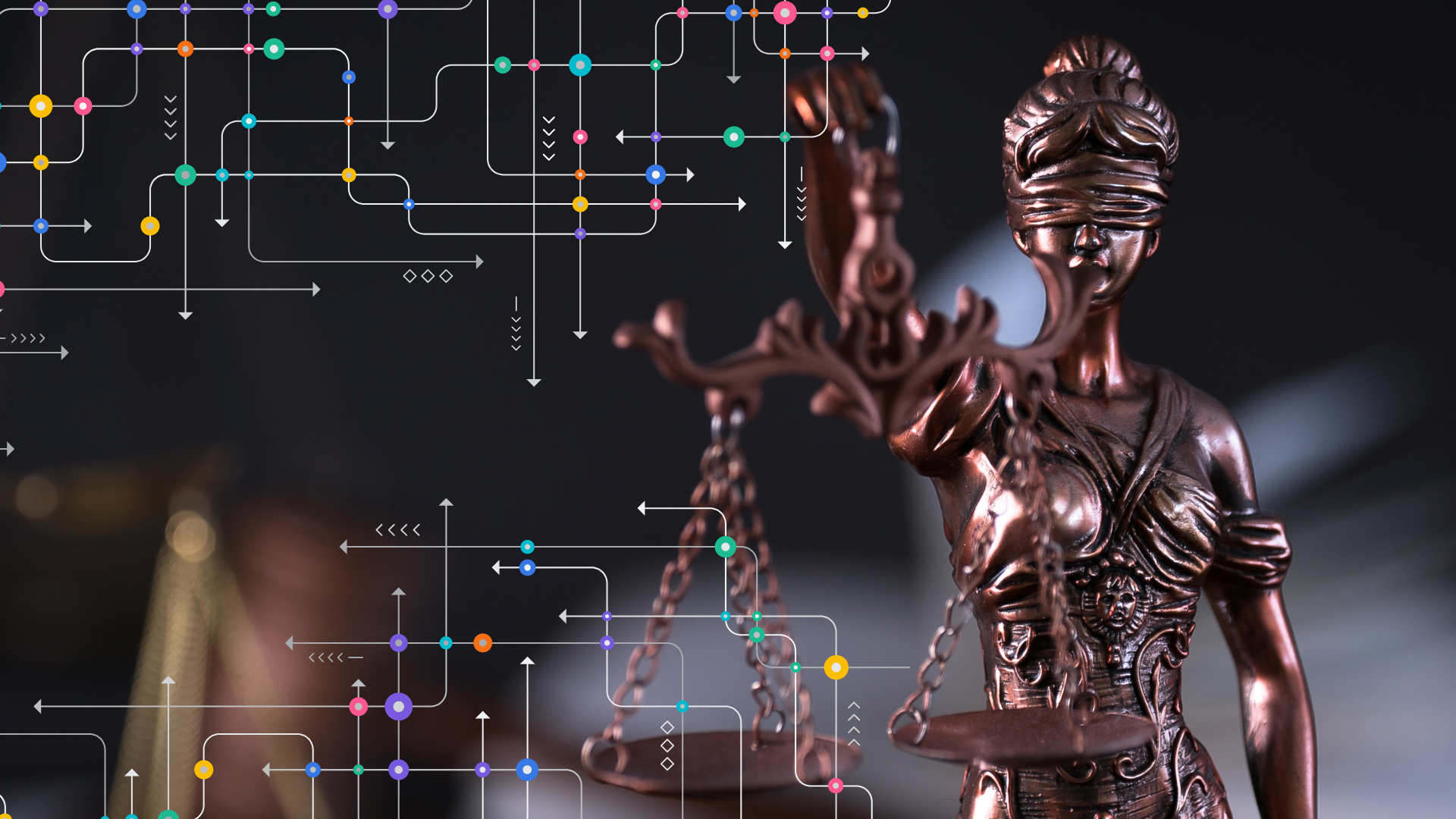Content
The global legal technology market is expected to reach $45.1 billion by 2030, with an average annual growth rate of 9.3%. Given the overall digitization across various sectors, this trend is hardly surprising. Professionals from nearly every field are eager to simplify and enhance their activities using progressive digital solutions.
The traditionally conservative legal business is no exception.
The past year was marked by the adoption of generative AI, the development of machine learning technologies, and predictive analytics. AdvantiSS experts decided to look into the future and speculate on what awaits the legal tech industry in the second half of 2024.
Technologies That Will Be Emphasized in Legal Industry in 2024
Technologies that emerged in legal practice in 2023 will continue to strengthen their positions this year. Below, we present a list of technologies that will have the greatest impact on the development of the legal industry.
Artificial Intelligence and Machine Learning
Artificial intelligence (AI) takes a leading role in automating legal practices. Markets And Markets analysts predict that in 2024, the AI market within this field will exceed $1.236 million, with a CAGR of 31.3%.
The adoption of these technologies will grow to further simplify research work and prepare legal documents. We expect more platforms based on AI and ML to be created to facilitate case preparations for court, automate document flow and invoicing, optimize interaction between participants in legal processes, etc.
These tools will also analyze large volumes of data. In the legal context, this is invaluable for searching and studying legal precedents.
Adoption of AI- and ML-based digital products will:
- Reduce the number of errors caused by human factors. The research from NetDocuments states that human errors were the cause of 39% of data breach incidents in the UK’s legal sector. Mainly, because of failure to redact sensitive information properly, misuse of cc and bcc fields in emails, alteration of data, hardware misconfiguration, and sending documents to the wrong recipient. We expect that AI will be able to tackle many of these issues by introducing a new level of precision and automation to tasks that have traditionally been prone to mistakes.
- Improve the quality of interaction with clients and within the team. AI-based digital products, namely CRMs, will get enhancements for automated and more personalized communication. More platforms will include AI-powered lead scoring, sales forecasting, and email marketing automation, among other benefits. Our experts assume that CRM platforms will be able to analyze the tone and emotion behind customer communications. Also, CRM platforms will integrate more deeply with voice assistants and visual recognition technologies to facilitate support and sales processes.
- Ensure cybersecurity. We expect AI-powered cybersecurity solutions will be more integral to defending against increasingly complex cyber threats in 2024. We might see the rise of AI systems capable of automatically responding to threats in real-time. AI will advance to predicting future threats by analyzing patterns, behaviors, and anomalies in vast datasets. Also, we expect AI algorithms to become more adept at distinguishing between normal and suspicious user behavior for accurate detection of insider threats and compromised accounts.
Generative AI
Microsoft‘s report “Generative AI for Lawyers” states that about 40% of legal companies have already begun to gradually integrate generative AI.
Our team anticipates that the use of GenAI in the legal field will continue to advance. Specifically, we’ll see growing confidence in AI’s ability to generate text and other media data. A focus will be on refining the ability to identify irrelevant information provided by ChatGPT and similar tools. This could pave the way for AI-generated data to be admissible as evidence in legal proceedings.
GenAI-based tools will allow to:
- Increase the efficiency of lawyers’ work. The same report by Microsoft mentions that up to 44% of work in a legal company can be automated using AI-powered tools. This will free up specialists’ time for more important tasks and for serving more clients.
- Reduce expenses on delegating tasks to external firms. The results of a study conducted by The Association of Corporate Counsel (ACC) last year show that 66% of respondents plan to discontinue services from external organizations to save on expenses, despite the increased workload this might entail. Tasks that previously required the expertise of high-cost external firms will be handled with GenAI tools internally.
- Increase company revenues. Based on the latest survey by PWC among leaders of major law firms, 69% of them believe that using generative AI-based tools will positively impact company profitability.
Predictive Analytics
It’s not a surprise that the legal analytics market is rapidly evolving. In 2021, it was valued at $1.5 billion. By 2031, its volume is expected to increase to $6.8 billion. Because the operations of any legal company involve daily processing, analysis, and decision-making based on vast amounts of data, many of them seek ways to streamline their flows.
Predictive analytics based on AI excels at such tasks like no other. With this technology, legal companies will be able to:
- Identify patterns, relationships, and trends in data obtained from various sources: court records, legal documents, and even websites and social networks.
- Mitigate risks. Data analysis will help thoroughly study all the aspects involved in the legal process. The better you’re prepared for the case, the higher your chances of winning it.
- Increase the speed of preparing legal documents. Predictive analytics platforms will allow processing and analyzing large volumes of data. Coupled with other AI-based tools, they will enhance the productivity of specialists and streamline document preparation.
NLP
A recent report by Markets and Markets mentioned that the Natural Language Processing market was valued at $18.9 billion in 2023. By 2028, this figure is projected to grow to $68.1 billion.
Considering the vast number of channels and formats for obtaining information in the legal field, NLP simplifies the work of lawyers.
Here’s what Natural Language Processing in jurisprudence will allow doing in 2024:
- Improve customer service quality. NLP recognizes human speech, so it will make communication with chatbots nearly as natural as with a real consultant.
- Optimize legal search. Lawyers frequently look through many documents daily to find similar legal cases, gather evidence, and perform other tasks. The standard methods of legal search often fall short as the results may fail to meet the query. NLP will refine searches by allowing one to consider the field of law, case circumstances, its outcome, and other essential parameters.
- Draft legal documents skillfully. The wording in a contract or lawsuit often influences the legal outcomes and the trust of partners and clients. Applying NLP will help minimize document drafting errors and increase the chances of success. Additionally, NLP-powered tools will be able to more effectively translate documentation into foreign languages. This will eliminate the need for translator services.
Changes in the LegalTech Industry
With the technological advancements available to lawyers in 2024, it’s clear that this field is already undergoing radical changes. Among them:
1. Data generated by AI will be taken more seriously in court.
This shift is facilitated by a deeper understanding of AI and ML-based software. Legal experts recognize that blindly relying on results from ChatGPT and other tools isn’t prudent, as the outputs depend entirely on the data they’ve been trained with.
The trend towards conscious AI use emerged due to several negative experiences in global legal practice. For example, the case against Avianca Airlines handled by the attorneys of Levidow, Levidow & Oberman in New York. Attorneys Steven Schwartz and Peter LoDuca used materials generated by ChatGPT to prepare for the lawsuit. However, they didn’t verify the accuracy of the obtained data, which turned out to be inaccurate.
2. More people will represent themselves in courts.
This is driven by the increasing availability of information in the legal field. So, more individuals will favor self-presentation.
There are already platforms where users can get information about the peculiarities of legal proceedings, learn about similar cases and their outcomes, and receive decision-making recommendations at each stage of litigation. Take, for example, Courtroom5. This platform helps gain clarity on how to plead your case, file legal documents, and more.
3. All efforts will focus on overcoming challenges in implementing innovative technologies.
The common challenges are cybersecurity, the legality of using open data for training machine learning models, and a lack of experience in the development, implementation, and use of AI in the modern legal industry. Let’s delve into each of these problems in more detail.
Major Challenges Associated with the Transformation of the LegalTech Industry
The emergence of new technologies brings about challenges in its utilization. This is inevitable, but when it comes to AI, the benefits undoubtedly outweigh the potential difficulties.
So, the application of AI in jurisprudence sparks certain debates among professionals. Let’s discuss the main ones.
Cybersecurity
Jurisprudence deals with a large amount of information, including personal and confidential data. This raises significant concerns about data protection, especially when such information is processed by AI tools.
Interestingly, on the one hand, AI can pose security risks. But on the other, it offers solutions. Advanced AI-based products can quickly identify threats and instantly eliminate them. Their operation relies on deep analysis of large volumes of data in real time. This will allow detecting the existing threats and predicting potential ones for proactive management. The systems powered by AI can isolate affected systems, deploy patches, and counteract attacks as they happen.
Per IBM, global companies lost an average of $4.45 million due to cyber incidents in 2023. However, the use of AI could have reduced them by nearly half.
Copyright Issues
We’ve already mentioned that the accuracy of data generated by AI tools depends on the quality of input data used to train these machine learning models. Therefore, companies dealing with generative artificial intelligence are constantly searching for open sources of information to enhance their digital solutions.
This can raise concerns over copyright compliance. The first precedents happened at the end of 2022. The New York Times filed a lawsuit against the creator of ChatGPT – OpenAI – for using the publication’s articles without permission to train its algorithms. According to the company’s lawyers, this made the AI-based solution a competitor to The Times.
In 2024, many lawyers and professionals in other fields worry that AI-powered solutions will learn from their work and offer potential clients alternatives to their services – virtual assistants, chatbots, and specialized platforms.
Developers are trying to find a way out of this situation to ensure authors benefit from using new technologies.
Lack of Experience
As stated by Bloomberg Law, 96% of lawyers have heard of GenAI technology. At first glance, the statistics seem optimistic. However, only 7% of respondents have used this technology for work-related tasks and 30% for personal purposes. For 59%, artificial intelligence remains purely a theoretical concept.
The reason for the lack of widespread AI adoption is that all the technologies we discuss in this article are still under development. There is a shortage of specialists capable of integrating AI-powered applications into the working processes of legal companies, and training personnel to work with them.




